Decades: Compiling the Ultimate Library with Alex Walters
Another week has zipped by and already it’s time to throw open the doors of the Decades Library and welcome a new guest curator who will shortly tempt your TBR with some new reading recommendations.
But before we get to the books its the obligatory recap. What’s a Decades Library and why do I have a guest curator?
Back in January 2021 I asked myself the question: if I had a brand new library but no books which books should I add to the Library shelves to ensure I had the very best reading options available for Library visitors? I knew this was far too difficult an undertaking to take on alone so I have reached out to my friends for help. Each week I invite a new guest curator to join me and I ask them to nominate new books which they feel I should add to the library. I want their favourite books, the “unmissable” titles or the books which left a lasting impression.
Why is it a Decades Library? I had to bring a little order to the chaos of asking booklovers to recommend some of their favourite books – seriously, two years later there’s a real danger we would still be listening to my first guest listing the books she loves. Instead I set two rules to govern the choices each guest makes:
1 – You Can Select ANY Five Books
2 – You Must Choose One Book Per Decade From Five Consecutive Decades
So any five books but restricted to a fifty-year publication span. Easy? Have a go at selecting your own favourites, you may find you re-discover some old favourite reads.
This week it is a real delight to welcome Alex Walters to the Decades Library. I spent my teenage years in the Black Isle and Alex has written a series of books where I get to read about the characters walking down the streets of towns and villages I know so well. As a reader there’s nothing quite as exciting to me as seeing crime thrilers set in places I know. What a brilliant introduction that was to Alex’s writing and the bonus of discovering he had written lots of other books has meant I am enjoying playing catch up.
Time to pass the curator’s hat to Alex and let him guide you through the five books he wants to add to the library shelves….
 Alex Walters is the author of twenty one crime and thriller novels, across several series. His first books were set in modern-day Mongolia. Since then, he has written two books set in and around Manchester featuring the undercover officer, Marie Donovan (Trust No-One and Nowhere to Hide), five books with a paranormal edge featuring DCI Kenny Murrain (Late Checkout, Dark Corners and Snow Fallen, Stilled Voices and Life Remains), and six books set in the Scottish Highlands featuring DI Alec McKay (Candles and Roses, Death Parts Us, Their Final Act, Expiry Date, For Their Sins and A Parting Gift). His most recent series is set in the Peak District featuring DI Annie Delamere (Small Mercies, Lost Hours and Bad Terms), with a fourth book, Old Evils, out later this year from Canelo.
Alex Walters is the author of twenty one crime and thriller novels, across several series. His first books were set in modern-day Mongolia. Since then, he has written two books set in and around Manchester featuring the undercover officer, Marie Donovan (Trust No-One and Nowhere to Hide), five books with a paranormal edge featuring DCI Kenny Murrain (Late Checkout, Dark Corners and Snow Fallen, Stilled Voices and Life Remains), and six books set in the Scottish Highlands featuring DI Alec McKay (Candles and Roses, Death Parts Us, Their Final Act, Expiry Date, For Their Sins and A Parting Gift). His most recent series is set in the Peak District featuring DI Annie Delamere (Small Mercies, Lost Hours and Bad Terms), with a fourth book, Old Evils, out later this year from Canelo.
He has also written two standalone thrillers – Winterman, a historical crime thriller set in the East Anglian fens in 1947 and his most recent book, Human Assets, a humorous spy thriller.
Prior to becoming a writer, Alex worked in the oil industry, broadcasting and banking and as a management consultant working mainly in the criminal justice sector. He now lives on the Black Isle in the Scottish Highlands where he runs the Solus Or Writing Retreat with his wife, Helen, and a variable number of cats.
Amazon: https://www.amazon.co.uk/Alex-Walters/e/B00528T2NG?ref=sr_ntt_srch_lnk_2&qid=1675963265&sr=8-2
Facebook: https://www.facebook.com/alexwaltersauthor
Website: https://www.alexwaltersauthor.com/
DECADES
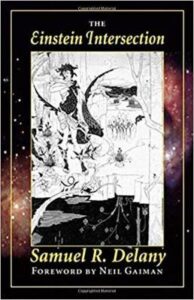 The Einstein Intersection by Samuel R Delany (1967)
The Einstein Intersection by Samuel R Delany (1967)
My choices here are books that made a major impact on me on first reading. I was a huge science fiction fan in my teens – though I’ve rather lost touch with the genre now – and initially borrowed this from the library largely on the basis of its title and intriguing style. It’s an extraordinary book – a retelling of the Orpheus myth, set among the non-human inhabitants of a distant-future earth. The narrative is intriguingly interspersed with literary quotations, epigraphs and (real?) excerpt’s from the author’s own journal. The book is sparse, allusive, elliptical and endlessly thought-provoking.
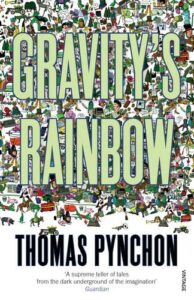 Gravity’s Rainbow by Thomas Pynchon (1973)
Gravity’s Rainbow by Thomas Pynchon (1973)
I first read Gravity’s Rainbow in my late teens, and I’ve re-read it several times since without ever getting close to fathoming its depths. It’s a huge compendious novel, almost impossible to summarise, set in the closing days of World War II. It combines real-life incidents with extraordinarily imagined, often hilarious fiction, addressing morality, science, war, sex and countless other themes in Pynchon’s unique and hypnotic prose style. Now, I need to read it again.
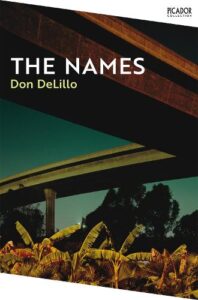 The Names by Don DeLillo (1982)
The Names by Don DeLillo (1982)
Like many people, I first came to DeLillo through White Noise, his breakout book in the UK. That sent my back to read his earlier books. Not all are to my taste, but the novel that stuck with me was The Names. It’s a tricky book to describe – a paranoid thriller, but with a plot that remains opaque, an exploration of the power of language, an examination of the nature of empire, even an atmospheric piece of travel writing, with a tone all of its own.
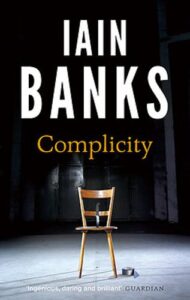 Complicity by Iain Banks (1993)
Complicity by Iain Banks (1993)
I was keen to include something by Iain Banks because he’s one of the writers who has given me most straightforward pleasure over the years. I’ve chosen Complicity because it’s perhaps one of the less well-known of his books, but it’s a wonderful example of his ability to tread effortlessly the line between popular and literary fiction. Complicity is a terrific page-turning thriller, filled with memorable if often dislikeable characters, but it’s also a powerful meditation on politics and power.
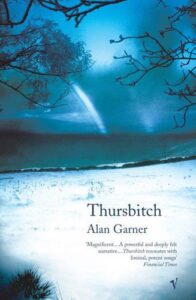 Thursbitch by Alan Garner (2004)
Thursbitch by Alan Garner (2004)
Garner is probably the writer who has had most impact on me, from the early books I read as a child through to his more recent, often challenging works. He’s far from a prolific novelist, and every book feels as if it’s been chiseled from a mass of thought, experience and research. Thursbitch is characteristic of Garner’s later work in building unexpected bridges across time and between ideas. In this case, the death of Jack Turner, an eighteenth century ‘jagger’ or salt-trader, is told in parallel with that of a contemporary couple, Ian and Sal, a geologist dying of a degenerative illness, drawing us into ancient bull-cults, shamanism, sentient landscapes, and the nature of time. It’s hugely atmospheric novel, rendered all the more potent for me by my familiarity with its Peak District setting. And its epigraph is taken from Jean Cocteau’s film Orphée, which, accidentally but satisfyingly, takes me full circle back to my first choice.
For the first time in a long time I haven’t read any of the five recommendations. This is why I have enlisted guests to help me pick the best books for the library shelves. But it is also bad for my TBR as Alex has tempted me into two book purchases as I have been pulling this post together – both The Names and Complicity are soon to be winging their way here. I am weak but I love a good book.
Huge thanks, as ever, to Alex for taking time to make his selections.
DECADES WILL RETURN